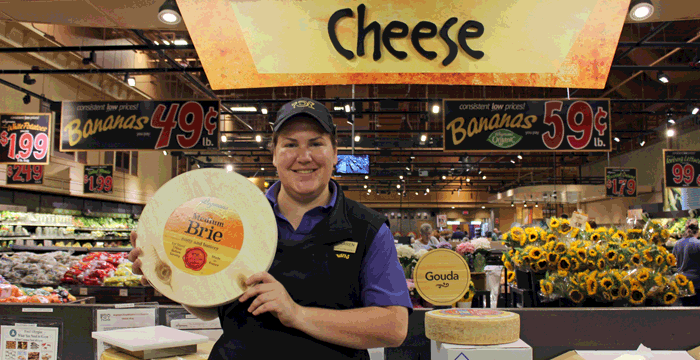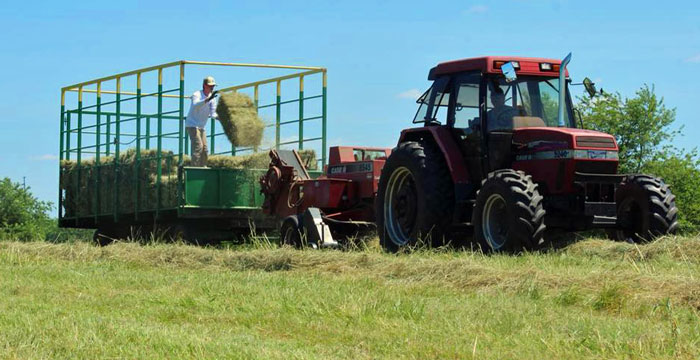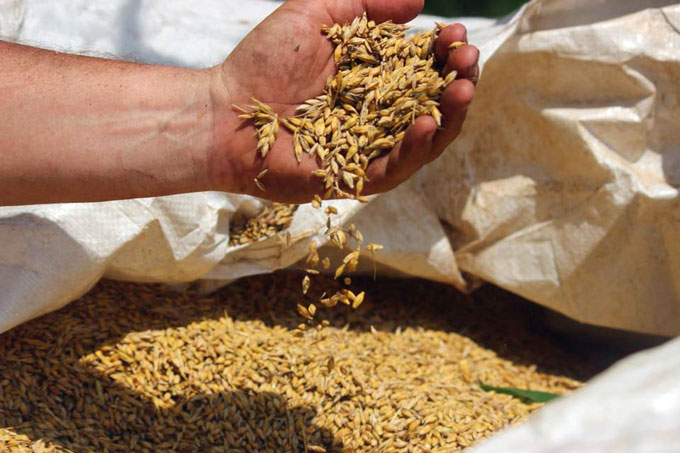
How Wegmans Makes Zero Waste a Team Effort
We’re partnering with fan-favorite grocery store Wegmans to find out about another soon-to-be favorite sustainability initiative: zero waste. In our second post, find out how this initiative spread to Wegmans’ partners eager to get on board. If you haven’t read our first post on how Wegmans is going zero waste, read it here.
Wegmans Food Markets takes food waste seriously. Under the leadership of Manager of Sustainability Jason Wadsworth, the company relies on a reduce, reuse, recycle approach to find a second purpose for excess food and food waste.
Finding food a second life: How Partners help Wegmans go Zero Waste
Using the EPA Food Recovery Hierarchy, Wegmans has a system for how to deal with the excess. First, Wegmans focuses on reducing waste at the store level. Next, perishable but unsold items are donated to local food banks. Food that cannot be donated for human consumption goes to giraffes at local zoos or used as feed for local farmers’ livestock. As a last resort, food is composted to be reused in another life or sent for anaerobic digestion.
Wegmans is certainly innovative on how to reduce food waste, even reducing our fossil fuel dependency. Food scraps are taken to partner farms, where a biodigester breaks down the waste into methane gas, which is converted into electricity for farms and allow them to go off the grid. One of these operations could save enough energy to power 400 homes each year. In 2017, 3.3 million pounds of food waste were transformed into clean, renewable energy.
Overall, dealing with waste responsibly at Wegmans is a group effort both inside the store and with external partners.
As part of his responsibilities, Wadsworth works with haulers who are removing trash, recycling and food scraps from stores. In line with Wegmans’ mission, he ensures that third parties are on board with zero waste, too. At times, Wadsworth has chosen to end contracts with haulers who were too tied to the landfill model, allowing him to focus on improving the recycling and composting rates.
One of Wegmans key partners includes a composting company with an unlikely background. Let’s meet Two Particular Acres.
Mission Aligned Partners: how Ned Foley went From Suits to Composting  Photo: Ned Foley of Two Particular Acres. Courtesy of Facebook
Photo: Ned Foley of Two Particular Acres. Courtesy of Facebook
As a former lawyer, Ned Foley dabbled in composting – but through the regulatory aspect. However, he saw that he could make a more significant impact on the world. After seven years of working on the economic and composting process, Foley traded in his suit and center city law firm for a farm and commercial composting business with five sites in Eastern PA.
“Folks like Ned are visionaries.”
Jason Wadsworth, Wegmans Manager of Sustainability
Now, Foley’s company, Two Particular Acres, services over 150 stops each week of restaurants, colleges, universities, convenience stores and more to pick up between 1.5 and 5 million pounds of compost each month. (Ironically, that’s not even the end of it: food waste may only make up 10% of a composting “recipe,” which is made up of browns and greens.)
Aside from making compost, food waste can create a pollution-fighting product as well. Although food waste is seen as pollution causing, local stormwater management system Green City, Clean Waters actually uses specialized soils formed from food waste. (How is that for a mind twist?)
“Wegmans is not only helping us grow better food and healthier soil, but they’re saving farmland all at the same time.”
Ned Foley, Two Particular Acres
For Wegmans, partners like Two Particular Acres take care of a big piece of their waste diversion. Two Particular Acres composted almost 3 million pounds of food scraps from 9 stores in 2016.
Two Particular Acres takes anything that was once alive from Wegmans, including produce, shellfish, dairy, protein and more. (Although some composters cannot take animal products, the proteins tend to disappear quicker in a larger composting operation like Foley’s operation, helping the pile temperatures reach 160 degrees.)
Going full circle: from scraps to delicious beer
“Why can’t you make local beer with local ingredients?”
– Ned Foley
Locally grown barley. Photo: Two Particular Acres, Facebook
The creativity doesn’t stop with the types of products being composted. Recently, Wegmans found an opportunity to go full circle with Two Particular Acres.
After seeing local brewers promoting beers with German and English malt, Foley questioned why they couldn’t use locally sourced ingredients for local beer. As a craft beer enthusiast, Foley saw the food scraps becoming compost for his crops, including barley, and a light bulb went off.
Local brewers could use this opportunity to create a TOTALLY local beer, from grain to tap. Thanks to a partnership with Alan Gladish from Double Eagle Malt and Foley’s grains, Sly Fox brewed a beer using purely local malt. Of course, it only made sense to tap the beer at Wegmans, coming full circle from their compost scraps. Wadsworth perfectly timed Sly Fox’s “Circle of Progress” beer in Wegmans for Earth Day 2017.
Now, we’ve seen how Wegmans goes zero waste in store and with the help of partners. In our final installment of Zero Waste with Wegmans, find out how you can be a part of the equation, too.









